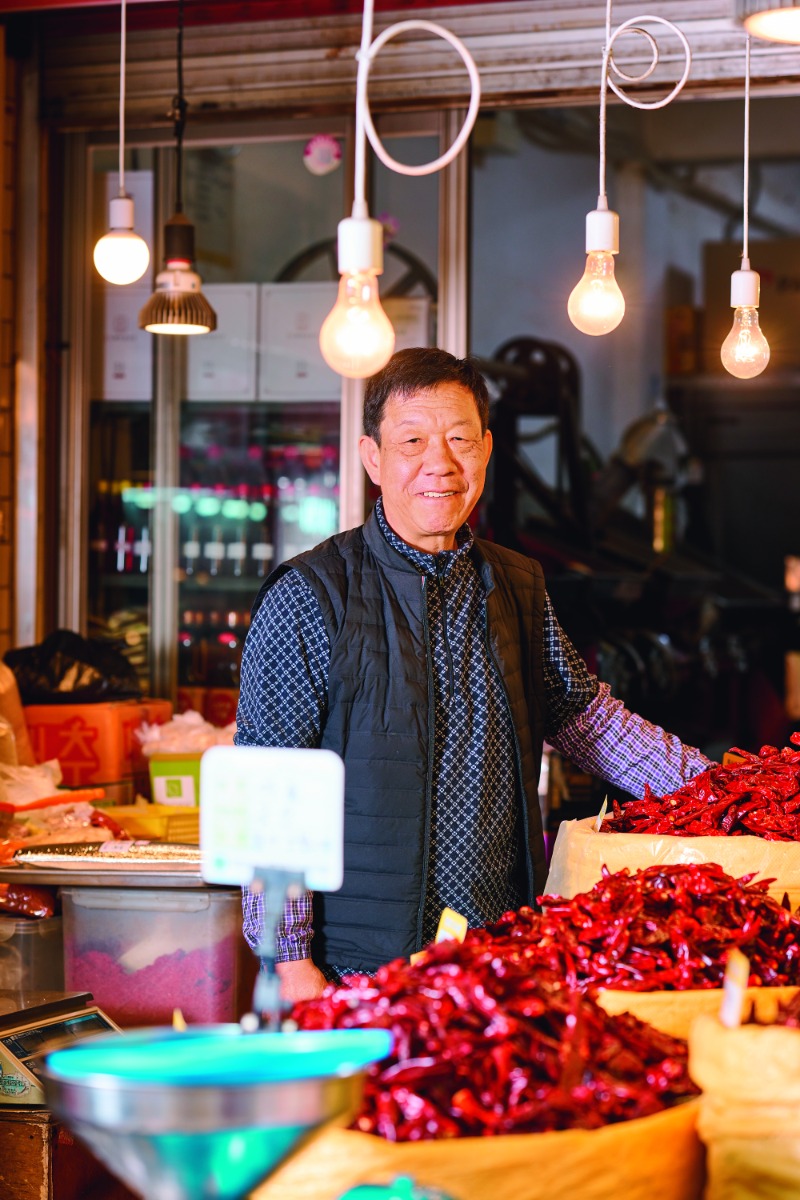No proper Korean meal is ever without sesame oil. It completes the flavor of practically every meat and vegetable dish. The sesame oil sold at the modest, family-run shop Daeu Gochu Chamgireum makes it a go-to shopping destination for many households.

Yu Mun-seok, owner of Daeu Gochu Chamgireum, has been selling sesame oil from this very spot for the past 38 years, following in his mother’s footsteps and laying a path for his son to succeed him. The shop also sells other Korean kitchen staples such as garlic, mixed rice, and anchovy sauce.
When seoul subway passengers leave Amsa Station, they may quickly catch a whiff of different smells and hear animated conversations, as the Amsa Complex Market is only a few steps away.
Opened in 1978, the market is packed with more than a hundred shops and stalls selling an eclectic assortment of meat, fish, vegetables, clothes, snacks, and grain. One of its distinctive gastronomic aromas comes from Daeu Gochu Chamgireum. The family-run shop opens every day, and the bouquet of its fresh-pressed sesame oil is a market constant.
“A lot of customers who used to live here have moved out of the neighborhood. I would hate for them to come all the way back here and find us closed. That’s why it’s hard to take a day off,” says shop owner Yu Mun-seok.
A FAMILY AFFAIR
To produce sesame oil, sesame seeds are rinsed, dried, roasted, and pressed. Squeezing one mal (about 6 kilograms) of sesame seeds produces six or seven 350 ml bottles.
The business is a three-person operation. There is only Yu; his wife, Shin Ye-seo; and their oldest son, Yu Seo-baek. The shop opens every morning at 7:30 and closes at 8:30 in the evening. The son takes a day off once a week to spend more time with his children. But his parents never rest until after their 13-hour workday, even though their home is only a five-minute walk away.
The day is spent pressing sesame oil (
chamgireum) and perilla oil (
deulgireum), grinding red pepper powder (
gochugaru), and making seonsik, a powder of healthy grains dissolved in water or milk. The powder includes waxy and non-waxy barley; brown glutinous rice, germinated brown rice, and black sweet rice; green kernel black beans and corn; white and black sesame, peanut, walnut, pumpkin, and sunflower seeds; as well as almond, banana, and millet.
Two years ago, at the height of the COVID-19 pandemic, Yu Seo-baek quit his office job and joined his parents. “It wasn’t an impulsive decision; I’d been considering it for a while,” he says. “My father is getting older, so I knew it was time to start getting ready to take over. Then the pandemic started and I figured we ought to start selling online too, so I made the move.”
His mother voiced misgivings. “Running your own business means a lot of physical labor and mental stress. Sometimes things go well and sometimes they don’t. It may look like you just sit around selling and collecting money, but it isn’t like that at all,” she says.
“My stance was, ‘You go work in your office. Have a comfortable life instead of following in our footsteps.’ But then things went the way they did and now we’re all working together — so there are some aspects I regret, as a parent. We had a hard life, and now our son will have a hard life, too.”
Still, Shin feels being self-employed is better in terms of income stability. “That was partly why I couldn’t really object. If you work in an office, you must quit at a certain age. This job has no retirement age. As long as you’re healthy and mobile you don’t have to worry about making a living, which is a comfort.”
WATCH AND LEARN
Yu senior’s journey into sesame oil began in the late 1970s, after he had completed his compulsory military service. He helped his mother, who was selling red pepper powder. Back then, it was an essential ingredient in every household that made their own kimchi and cooked every meal at home. Demand was particularly high during
gimjang (kimchi-making) season, which came around in early winter. But as times changed, the number of people looking for red pepper powder steadily shrank, as busy families increasingly opted for store-bought kimchi.
“At the time, the shop right next door to ours pressed sesame oil,” Yu explains. “We visited each other all the time, so I was always seeing them work, and it just occurred to me — I could do that, too.”
Sesame is the very first entry among the thousands of medicinal herbs and ingredients listed in the natural medicines section of
Principles and Practice of Eastern Medicine (
Donguibogam), compiled by Heo Jun (1539–1615) and included in the UNESCO Memory of the World Register since 2009. Sesame is also called
hyomaja, which means “better at filial piety than one’s son.”
The preparation of sesame oil is designed to improve the proper absorption of sesame seeds’ nutrients. Its three virtues are said to be the prevention of stroke and myocardial infarction, the darkening of gray hair, and anxiety relief. Sesame seeds contain 45–55 percent oil and 36 percent protein, but they are also rich in insoluble fiber, making them difficult to digest.
To make the oil, sesame seeds are washed, dried, and then stir-fried for about 30 minutes. After the seeds are cooled, they are squeezed in a hydraulic press. One
mal is the unit of measure, which is equal to six kilograms and produces six or seven 350 ml bottles.
Casual shoppers tend to think that rich color and scent are the markers of a good sesame oil, but this is not necessarily the case. The color and aroma deepen the longer the seeds are stir-fried, but, in turn, they also lose their nutritional value. In fact, there are customers who prefer a lighter color and aroma, so the Yu family constantly needs to adjust to meet customer preferences. Yu and his son perform the seed preparation, stir-frying, and pressing throughout the day, while Shin mostly deals with customers. She must always be totally aware of the type of seed used. Sesame oil pressed from domestic seeds is about three times more expensive.
GOING ONLINE

As more and more people rely on food deliveries and meal kit services, sales of sesame oil and chili powder at traditional markets have declined. Nevertheless, the Yu family’s shop is open year-round even as the Yus try to ramp up online sales.
Regulars who go out of their way to come to the shop from great distances are always on Yu Mun-seok’s mind.
“I’ll ask them, ‘Isn’t there any sesame oil where you live? Why come all this way?’ It’s not like I can give them a better price than any other spot… All I can do is put my heart into the pressing. But still, they come back every time,” he says.
Shin spends most of the day handling sales and swapping tips. “When people ask me this and that, I’ll teach them my know-how, and sometimes I learn from them too. Like how you should store sesame oil at room temperature but perilla oil in the refrigerator, or how you don’t actually need green onion or garlic when dressing seasonal greens — just salt, sesame oil, and sesame seeds will actually produce much better flavor.”
The shop has been operating for 38 years, and Shin and Yu have been married for 36 years. After work, he has a well-deserved drink and she catches up with housework.
Eventually, Shin may have less face-to-face interaction with customers. The pandemic considerably raised the profile of the Amsa Complex Market. Largely stuck indoors, regulars tried to order online and the market rose to the challenge. It developed the first “Our Market, Speedy Delivery” system in Korea, making nationwide sales possible.
At this point, the Yu family is hanging their hopes on online sales, where these same customers will be able to receive their goods in the comfort of their own home.
“We don’t have a ton of online sales yet. But we still have to move our operations more and more online,” says Yu. “It won’t be easy, but our son is working hard, so I’m sure it’ll work out.”
Hwang Kyung-shin Writer
Han Jung-hyun Photographer